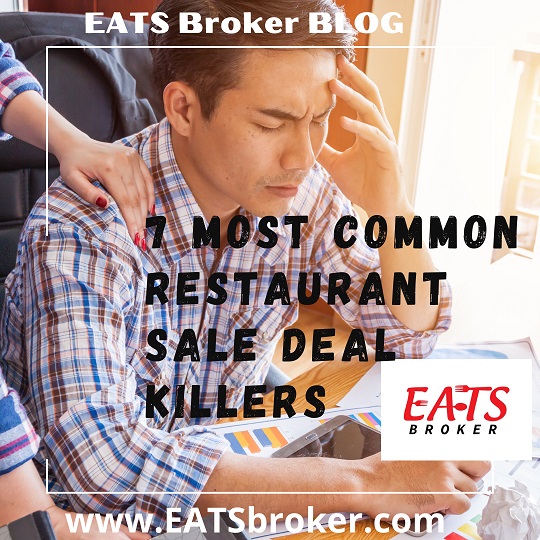The most common restaurant sale deal killers are items that are usually out of the hands of a Restaurant Broker. The process to sell a restaurant can feel like a marathon that many participants will have fatigue and not finish the race.
It’s a known fact in the Restaurant Brokerage industry less than 50% of businesses that go under contract will close. Some Restaurant Brokers might advertise hiring closing rates, which could be possible.
The Restaurant Broker at EATS Broker Dominique Maddox said, “some deal killers can be addressed upfront if they are known; it’s the unknown details that kill deals.
How will the landlord, bank, and Franchisor react to the new potential buyer? Did the seller provide all the details? Over my ten years of selling restaurants, I have seen it all”.
Restaurant Broker list of Common Restaurant Sale Deal Killers:
- Landlord- The landlord is the KING for restaurant sale deal killers. The landlord owns the property, and transactions cannot be completed without a lease assignment or lease. A majority of the landlords are simple to work with because they want a guarantee they will continue to receive monthly rent.
- Bank-When a restaurant for sale can qualify for SBA lending, the chances of that restaurant selling increase drastically. That’s the good news; the bad news is that it takes some serious legwork and patience to get a deal to funding.
Banks have several qualifying requirements a buyer must be able to pass. There are many reasons why a buyer may not qualify for lending. Example credit score, lack of liquidity, no collateral or don’t want a lien on collateral, etc.
- Franchisor: Franchise approval is only an issue with Franchise Restaurants for Sale. Franchise resale listings are popular with restaurant buyers, but the buyer has to get approved by the Franchise.
Franchisors have many requirements before they approve a buyer to become a franchisee. If a restaurant is a franchise for sale, the sale cannot be completed without the Franchisor’s approval of the buyer. Franchise resales require the buyer to travel to the Franchisor headquarters for a discovery day.
The Franchise can schedule training in a different state than the restaurant for sale. Buyers are responsible for paying the transfer fee, travel arrangements, and housing accommodations while attending training. The training time can range from 2-8 weeks depending on the Franchise Brand.
- Restaurant Buyer Expectations: Rule #1 Buying a restaurant differs from buying a home. The majority of buyers that purchase a restaurant are first-time buyers and don’t understand the buying process.
Buyer fatigue and misunderstanding is a fundamental reason why some transactions fall apart. The buyer should educate themselves about the buying process and work with a Restaurant Broker thru the process.
- Restaurant Seller Expectations: Restaurant sellers can misunderstand the restaurant sales process. Sellers have to understand that everything is negotiable for a buyer’s offer (except rent terms). Restaurant owners have to be willing to negotiate, provide supporting documentation, be patient, and be trustworthy.
Restaurant sellers have to understand if the documentation they provide to a Restaurant Buyer during the due diligence period doesn’t check out, the buyer might want to submit a counteroffer and renegotiate.
- UCC liens: A UCC-1 financing statement is a legal form that a creditor files to give notice that it has or may have an interest in the personal property. Restaurants for sale should have the ability to sell a restaurant that is free and clear of liens.
The closing attorney will conduct a UCC lien search on the business weeks before closing. If a UCC lien is discovered, the restaurant owner will have to pay the fees before closing or at the closing table.
- Time: It’s a known fact in selling a restaurant that Time Kills deals. The longer the process to sell a restaurant, the greater the deal’s chances of falling apart. Buyer fatigue and seller fatigue become an issue if an agreement is dragged out.
Buyer and seller work off a closing checklist, and both parties must work together to meet deadlines.
To learn more about EATS Broker consulting services or to receive a complimentary restaurant valuation, contact Dallas Restaurant Broker Dominique Maddox at 404-993-4448 or by email at [email protected]. Visit our website at www.EATSbroker.com.


